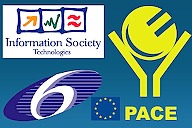The PACE ethics workshops
The social and ethical implications of protocell technology (ECLT Venice Italy, 26 February 2005)
The creation of protocells will raise a number of important social and ethical issues. These include potential benefits to individuals and to society, potential harms including health and environmental risks, and violations of cultural, religious, or moral prohibitions. The aim of this workshop was to spark a systematic investigation of these social and ethical issues.
- Mark Bedau,
Protolife Srl,
Venice; Reed College Department of Philosophy, Portland
- Social responsibility and protocell technology
- Brigitte
Hantsche,
Soziologisches Forschungsinstitut, Institut für Medizinische
Soziologie an der Universität Göttingen; Institut Frau and
Gesellschaft
- The ambivalence of artificial cell technology: a challenge of ethical dimension between the conceptual tradition of human rights and socio-cultural achievements
- Per Sandin,
Philosophy Unit, Royal Institute of
Technology, Stockholm
- Precaution and artificial cell research
- Brian Johnson, Biotechnology Advisory Unit, English
Nature; BBSRC Science and Society Panel
- The need for ethical codes as frameworks for research and development in the biosciences
Social and Ethical Issues in Protocell Research (LANL Los Alamos, USA, 21 July 2005)
The
development of protocells promises to produce vast social and
economic benefits while also creating unprecedented risks to society
and the environment. This workshop attempted to articulate the key challenges
that society must confront as it decides whether and how to develop
protocell technology. One challenge concerns how to conduct
meaningful risk assessment when the potential consequences of
protocell technology are so uncertain. Another concerns how to
exercise proper precaution with protocell technology without forgoing
its important benefits.
- George
Khushf,(Center for Bioethics, University of South
Carolina)
- Why bionanotechnology forces us to rethink how we approach ethical issues integral to scientific research
- David
Magnus, (Associate Professor of Pediatrics,
Stanford Center for Bioethics)
- The Big Gamble: what role should the public play in assessing risks?
- Carl
F. Cranor, (Department of Philosophy, University of
California, Riverside)
- What Can We Learn From the Risks and Benefits of Other Technologies for Assessing the Introduction of Artificial Cells?
Social and Ethical Issues in Protocell Research: Assessing Risk and Responsibilities in an Uncertain World (ECLT Venice, Italy, 2 October 2005)
The creation of protocells will raise a number of important social and ethical issues. These include potential benefits to individuals and to society, potential harms including health and environmental risks, and violations of cultural, religious, or moral prohibitions. This was the third in a series of workshops sponsored by the EU PACE project aimed at investigating these issues.
- Christine Hauskeller,
(Philosopher, Researcher at the
ESPRC Centre for Genomics in Society, University of Exeter, Exeter,
United Kingdom.)
- Critical reflections on the biomedical creation of life.
- Mickey
Gjerris, (Assistant Professor, Danish
Center for Bioethics and Risk Assessment, Copenhagen.)
- This is not a hammer: On ethics and technology.
- Bill Durodiť,
(Senior Lecturer in Risk and
Security, Defence Academy of the United Kingdom, Cranfield University,
United Kingdom. )
- Ethics versus experimentation: Scientific advance in a culture of precaution.
- Jean-Pierre
Dupuy, (Professor of Moral Philosophy and
Ethics, Ecole Polytechnique, Paris, and Stanford University,
California.)
- Is making life from scratch "playing God"? Towards a non-theological ethics of life engineering.
Social and Ethical Issues Concerning Protocells: Questions and Answers (ECLT Venice, Italy, 16-17 March 2006)
In this workshop invited experts engaged in discourse with PACE scientists about their views on the answers to a list of key questions regarding the ethical and social issues of protocell research and development. The organizers distributed a preliminary list of questions at the workshop, which was augmented with contributions from the workshop audience.
- Bill Durodiť,
(Senior Lecturer in Risk and
Corporate Security
at Cranfield University)
- Recommendations about social and
ethical issues concerning protocells
- Recommendations about social and
ethical issues concerning protocells
- Brian Johnson, (BBSRC Bioscience in Society Strategic
Panel)
- Recommendations about social and ethical issues concerning protocells




